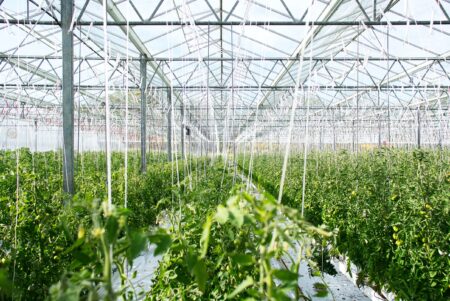Nimanie Hapuarachchi
PhD candidate, Centre for Planetary Health and Food Security, Griffith University
We have so many dreams when we are young. Some of these dreams will turn into reality while some may stay a dream forever. But I believe your passion to make your dream come true will make it a reality. My dream was to become a scientist and I followed my passion for research to make that a reality. For me it all started with a famous crime TV drama, I was intrigued by DNA and all the lab experiments carried out to catch criminals. During my undergraduate years, my passion for working with DNA, molecules and chemicals pushed me to select my major in plant biotechnology. Now I am working as a PhD student doing research in the field of horticulture. Most of us have our heads in the clouds at the start of our PhDs thinking that there will be a Nobel prize winning discovery. However, the reality is that your study might not win you a Nobel prize, but it could make a big difference in someone’s life.
 When I started my PhD, I thought it is just lab experiments for 3 years and no exams. Yay! Now, I am in my final year of my PhD, and I know the true purpose of my work. My research study is focussed on improving farmgate profitability by increasing the yield and quality of fruits through crop nutrition and pollination. I am finding ways to help farmers increase their profit by producing high yielding good quality fruits. At the same time my study is aiming to ensure that consumers will get unlimited access to nutritious food. A driving factor for my study is knowing that conducting research within the agriculture sector will contribute, at least in a small way, to resolving the rising global food crisis. I feel like being part of agricultural research is a huge responsibility. Agriculture is one of the biggest and most important sectors in the world and it is responsible for feeding a global population of ~8 billion. I know that the findings of my study will have an impact on the fresh produce industry and that motivates me to push through all obstacles.
When I started my PhD, I thought it is just lab experiments for 3 years and no exams. Yay! Now, I am in my final year of my PhD, and I know the true purpose of my work. My research study is focussed on improving farmgate profitability by increasing the yield and quality of fruits through crop nutrition and pollination. I am finding ways to help farmers increase their profit by producing high yielding good quality fruits. At the same time my study is aiming to ensure that consumers will get unlimited access to nutritious food. A driving factor for my study is knowing that conducting research within the agriculture sector will contribute, at least in a small way, to resolving the rising global food crisis. I feel like being part of agricultural research is a huge responsibility. Agriculture is one of the biggest and most important sectors in the world and it is responsible for feeding a global population of ~8 billion. I know that the findings of my study will have an impact on the fresh produce industry and that motivates me to push through all obstacles.
A PhD is no smooth ride, one day you will be over the moon and the next day you will be crestfallen as your experiments have failed. Experiences I have had during the past two years have taught me that passion, resilience, critical thinking, and attitude will help you go a long way in your research career.
What’s next??
 Once you are near the end of your PhD, one thing on your mind is, what’s next? You frantically start looking for jobs. Is my experience enough? How can I use it to do something worthwhile for the community? Am I good enough for this position? You start getting the imposter syndrome. I was feeling this way some time ago. A survey carried out on early career researchers showed that majority of postdoctoral researchers are looking for a job in academia. Unfortunately, there are lack of job opportunities within academia. The COVID-19 pandemic has caused a big hit for universities financially, and layoffs have reduced opportunities for graduate researchers within academia. Therefore, graduate researchers are being pushed towards finding opportunities in other areas, such as industry or government. I started my PhD with hopes of sticking with academia, but I realised that I need a backup plan. That is when I decided to explore other job opportunities for graduate researchers. I attended career building workshops, seminars and discussed potential job opportunities with my supervisors. I realised that there are lot of other prospects out there, but we need to develop certain skills to gain a competitive edge in the job market.
Once you are near the end of your PhD, one thing on your mind is, what’s next? You frantically start looking for jobs. Is my experience enough? How can I use it to do something worthwhile for the community? Am I good enough for this position? You start getting the imposter syndrome. I was feeling this way some time ago. A survey carried out on early career researchers showed that majority of postdoctoral researchers are looking for a job in academia. Unfortunately, there are lack of job opportunities within academia. The COVID-19 pandemic has caused a big hit for universities financially, and layoffs have reduced opportunities for graduate researchers within academia. Therefore, graduate researchers are being pushed towards finding opportunities in other areas, such as industry or government. I started my PhD with hopes of sticking with academia, but I realised that I need a backup plan. That is when I decided to explore other job opportunities for graduate researchers. I attended career building workshops, seminars and discussed potential job opportunities with my supervisors. I realised that there are lot of other prospects out there, but we need to develop certain skills to gain a competitive edge in the job market.
Learning the right skills
A PhD does not only provide technical skills and subject knowledge but something more than that. It teaches the importance of networking, collaborations, presenting skills as well as writing skills. Employers are also looking for data handling and management skills, IT skills, time, risk and project management skills. Learning to communicate to a broader audience is essential in a research career. Developing these types of skills will help to improve your job prospects. Internships and voluntary work are ways to develop these skills and can be added as work experience to your resume. Attending career building workshops, or discussing careers with supervisors/mentors will help you to identify different job opportunities. The PhD journey is a big learning curve in your research career. Skills and knowledge you gather during your PhD make the designation of ‘PhD’ more valuable. Being open minded and flexible will help you to develop strengths, work on your weaknesses and prepare yourself as a worthy candidate in the job market.
It is normal to feel anxious at the end of your PhD journey, thinking what next. As long as you have an open mind, passion, interests, strengths and skills, they will help you to navigate your next journey in finding the most suitable job.
As Billy Ocean said, when the going gets tough, the tough get going….
Photo by Ian Schneider on Unsplash

Leave a comment